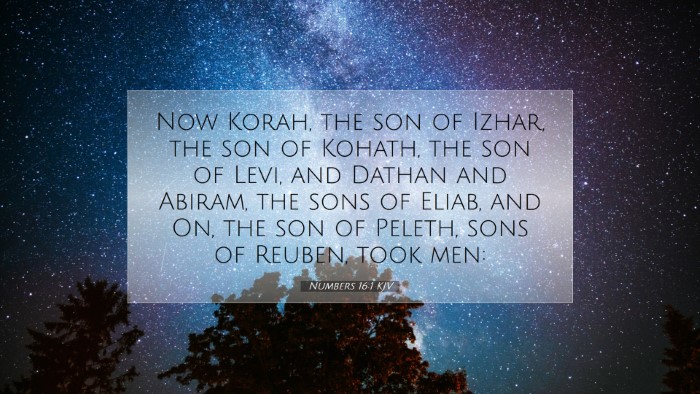Commentary on Numbers 16:1
Bible Verse: Numbers 16:1 - "Now Korah, the son of Izhar, the son of Kohath, the son of Levi, and Dathan and Abiram, the sons of Eliab, and On, the son of Peleth, sons of Reuben, took men."
Background and Context
The passage of Numbers 16 introduces a critical episode in the wilderness wanderings of the Israelites. The rebellion led by Korah serves as a dire warning against pride and the quest for authority outside of God's designated order. Korah, a Levite, spearheads a revolt against Moses and Aaron, representing a dangerous dissatisfaction with the established leadership.
According to Matthew Henry, the rebellion stems not only from ambition but also from an undercurrent of doubt concerning Moses' divinely appointed leadership. This act illustrates that human desires for power can lead to disastrous consequences, both for the individual and the community.
Character Analysis
-
Korah: Korah's lineage as a Levitical priest grants him a unique position within Israel. However, as Albert Barnes notes, Korah's desire for greater authority leads to a self-destructive path, revealing how envy can corrupt divine purpose.
-
Dathan and Abiram: As Reubenites, they embody the fraternal discontent that arises from tribal competition. Adam Clarke emphasizes their roles in perpetuating discord by aligning themselves with Korah's revolt against established order.
-
On: While lesser-known, On’s participation hints at the pervasive nature of rebellion in community contexts, demonstrating how even lesser figures can become entangled in others' disputes.
Theological Implications
At its core, Numbers 16 presents a reflection on divine authority versus human ambition. The revolt’s backdrop highlights a common theme throughout biblical history—the struggle against God-ordained leadership. Matthew Henry emphasizes that proper authority is rooted in God’s ordination, which should not be challenged lightly.
Albert Barnes elaborates that the challenge issued by Korah and his followers is ultimately a challenge to God's sovereignty. Their plea, suggesting equal access to holiness, undermines the specialized role designated by God to the priesthood, thereby misrepresenting God’s intentions.
Historical and Cultural Context
The setting of the wilderness, as described in Numbers, not only frames a literal journey but serves as a metaphor for spiritual growth and testing. As noted by Adam Clarke, each character's background and tribal affiliation deepen the conflict’s complexity and its ramifications for community dynamics.
The rebellion reflects a crisis in cultural identity at a moment in history when Israel was meant to unite under God's covenant. In clashing with settled structure, Korah and his co-conspirators highlight the fragility of community when faced with discontent and discord.
Practical Application
For modern readers, especially pastors and students of theology, Numbers 16:1 serves as a profound cautionary tale. The themes of ambition, authority, and divine order resonate in today's church context, where issues of governance and leadership remain contentious.
Matthew Henry asserts that spiritual leaders must continually seek God’s guidance and remain humble, especially when confronting envy or ambition from others. It is vital for the church to cultivate environments that prioritize God’s calling and qualifications rather than human ambition.
Albert Barnes encourages the faithful to acknowledge the ordained structures within their community and submit to leaderships established by God. Instances of discord, as seen in Korah's rebellion, highlight the need for community unity under shared faith and purpose.
Conclusion
In summary, Numbers 16:1 is not merely a historical account of rebellion but a timeless reminder of the distinctions between human authority and divine mandate. The insights drawn from public domain commentaries such as those by Matthew Henry, Albert Barnes, and Adam Clarke provide an analytical framework for understanding the spiritual dynamics at play. Their interpretations encourage readers to critically assess their own positions within their spiritual communities and to pursue God’s will above personal ambition.


